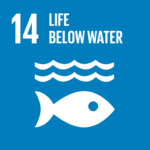In desperation, Indian fishermen have had little choice but to take to the high seas, setting off on multiweek trips that can take them more than 700 nautical miles from the shore, burning tremendous amounts of fuel and exposing them to turbulent weather.
THOOTHOOR, India — The fishermen gathered before dawn at the harbor in this cluster of Tamil Nadu fishing villages, preparing for another arduous journey into the increasingly depleted waters of the Indian Ocean.
Facing dwindling catches closer to shore, India’s fishermen are being forced to sail farther out to sea in search of a decent haul, a shift that has become both an economic necessity and a source of mounting danger.
RELEVANT SUSTAINABLE GOALS



Many are now venturing into distant high seas and even the waters of other nations, risking confrontations that can see their boats seized and crews imprisoned or worse. At least nine Indian fishermen have died in Pakistani jails in the last five years after straying across maritime borders, according to government data.
“Starting from Indian waters to international waters of Sri Lanka, Maldives, Diego Garcia, they navigate the length and breadth of the sea because the sea and fishermen cannot be separated,” said V. Buddhirasayee Arunan Saminathan, president of the South Asian Fisherfolk Fraternity.
Climate change shrinking fish
The depletion of fish stocks nearer the Indian coast is being driven by a confluence of environmental pressures. Rising ocean temperatures have decimated phytoplankton populations vital to the marine food web. Overfishing, coastal erosion and the loss of reefs and other critical habitats have further depleted the resources that India’s more than four million fishermen have long relied upon.
"Earlier, fish was coming to the shore but now we have to go after the fish,That is the reason we have become migrant and deep-sea fishermen."
" said Jhonny, a deep-sea fisherman from Thoothoor, Tamil Nadu - India
In desperation, they have had little choice but to take to the high seas, setting off on multiweek trips that can take them more than 700 nautical miles from the shore, burning tremendous amounts of fuel and exposing them to turbulent weather.
“Earlier, fish was coming to the shore but now we have to go after the fish,” said Jhonny, a deep-sea fisherman from Thoothoor who, like many area residents, goes by one name. “That is the reason we have become migrant and deep-sea fishermen.”
The National Fisheries Policy
The Indian government has moved to regulate and promote deep-sea fishing as nearshore stocks have declined. Under the National Fisheries Policy adopted in 2020, the government encouraged “deep-sea fishing and fishing in Areas Beyond National Jurisdiction to tap under-exploited resources.”
But the policy has done little to protect fishermen who inadvertently cross into the territorial waters of other nations on their far-flung expeditions. Hundreds have been detained by countries like Pakistan, Saudi Arabia and Sri Lanka.
India’s fisheries are hardly alone in feeling the strains of climate change and environmental degradation. But because of the Indian Ocean’s accelerated warming, those pressures have become particularly acute.
The Indian Ocean “is the warmest ocean and now it is warming at a much faster rate,” said Mathew Koll Roxy, a climate scientist at the Indian Institute of Tropical Meteorology. Dr. Roxy’s research shows phytoplankton populations declining as much as 20 percent over six decades as ocean temperatures have risen.
Such warming is expected to intensify in the years ahead, potentially putting even deeper marine habitats at risk even as the threats nearer to shore persist. Rebuilding depleted fisheries off India’s coastline could be one potential solution — the government has policies aimed at protecting breeding and conservation areas — though it remains an immense challenge.
In the meantime, India’s fishermen face little choice but to continue pushing out into more distant and perilous seas in pursuit of their next catch.
Lead image courtesy of hadynyah from Getty Images
You may also be interested in :
The Nature Conservancy (TNC) Publishes Regenerative And Restorative Aquaculture Framework


